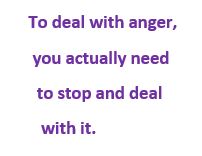Don’t Let Anger Take Control

What Can Make You Feel or Get Angry?
Overcome Adversity
- Unable to get what you want!
- Being told to do something you don’t want to do!
- The feeling of being put down, perhaps being shown up in front of others!
- Perhaps being listened too, but feel you are being humoured!
- Someone trying to wind you up and perhaps knowing your weak points!
- Not being allowed the space, time or opportunity to communicate your feelings!
There are many others, the list can be endless, but this highlights some causes for frustration that can lead to anger and outbursts that can spiral out of control unless we can master or self-control how we deal with difficult situations.
We cannot always control others, but we can be responsible for our own behaviour, attitude and outlook. Therefore, if we all took a little more time to think and evaluate the situation early, then many problems would be greatly reduced.
Sometimes even against our better judgement, it can pay just to agree to disagree, in other words what you hear and understand you perhaps strongly disagree with.
However, the sensible thing maybe to agree to differ, then change the subject or move on or away, [particularly if it is getting to boiling point].
Furthermore, you may realise for several reasons it may not be the right time, place, or environment for such a confrontation.
Sometimes, just by hearing and seeing the other persons point of view, even if you disagree can lower frustrations.
As sometimes by our listening skills we pick up information and clues that suggest that they are not trying to be harmful or obnoxious it is how things need to be for one reason or another.
This point is to make clear that when we are angry and perhaps shouting we are often not very good at listening, we just want to put across our point/s.
Furthermore, facial expressions and body language can convey clues, signals to how people maybe feeling even when little or no communication is involved. All this should be considered during anger and moments of frustration.
We need to take responsibility for our own actions, even when it may appear we are being provoked. By being verbally abusive, or threatening or using physical behaviour will only take you down and the consequences can be dire for you in many ways in the here and now and into the future.
So thinking first and having a calmer approach will solve more issues for you and the result will be of better outcomes, even if you didn’t get what you wanted or win your case or argument on that occasion.

Overcome Adversity!
Thinking of coping strategies!
Often sitting down rather than standing up appears less threatening when communicating and shows you are in more control, [if both parties agree to sit down then a better chance for an amicable discussion].
If standing give the other person some space don’t constantly eyeball and be right up into their face.
If the conversation appears heated, step back rather than forward. Retreating doesn’t mean advantage the other person, it means that you are the mature one and trying to play down the conflict situation.
It maybe a good idea to end the conversation with the view that you can resume later or even the next day when tempers appear dissolved, [time out gives both parties the opportunity to calm down and gives thinking and re-thinking time].
Try to show some agreement with them as applicable to lessen the conflict, listen and show some understanding and respond in a way that is not patronising or being disrespectful.
Remember you can be assertive and illustrate your point but don’t get into an unnecessary challenging and un-tasteful event.
If a solution cannot be found at least try and find some common ground to end.
Know when to withdraw and or move-on, be mature and sensible and be in control of yourself. [If applicable, use mediation to help resolve conflict].
Ideally, it is good when apologies can be met and or with acceptance as it probably means that the relationship can be restored.

Make friends & build positive relationships
Sometimes personal problems come to light through other subjects or topics of conversation that may intrude on our thought process and at that moment in time it may hit a sensitive note and may spark a reaction.
Instead of having control and realising the innocence of the remark made, we respond badly and show extreme anger. [If this becomes a regular occurrence and or becomes out of control behaviour then this may need to be addressed].
Also, we know that excessive usage of alcohol and or substance misuse don’t help.
Furthermore, some people maybe affected by caffeine or certain additives in some food products that may put your brain and body into a hyper state and this may cause a reaction and behaviour change.
It may not always be noticeable but can create problems if not identified.
If there is a suspicion then worth discussing with your GP and or health service. This is just another example as to why aggressive behaviour may occur and you may not always be in control over.

Your anger may not intend to be personal, but may come across as such and can be seen as out of control.
Anger is an emotion that we all can display from time to time, but it is being able to use it effectively in a constructive way and moving on.
However, from time to time we generally communicate, act in a passive and or an aggressive way. The balance is being able to feel comfortable and confident in using assertive skills, a technique and positive skills in reacting and responding to information as needed.
Assertive skills aim to be neither passive nor aggressive in there interactions with other people. Being assertive can help to feel better about ourselves, this can improve confidence & self esteem.
Is this is an area that you need support in, then coaching can help you to overcome this problem by implementing assertive techniques and skills.
Although we can generally get things right, it can be helpful to re-visit our thought process and to remind ourselves of the positive steps forward that we need to take and keep taking to stay on the right track and that goes for many areas of our life as we go through our life journey.
Doing meaningful – regular activities, exercise and meditation are some helpful ways to reduce aggressive feelings and behaviour. Also helpful to have a regular sleeping pattern.
Talking therapy – communication is always a positive way forward in finding ways to reduce and stop problems.
 The fact that you can talk about a problem, can show that you identify that an issue exists and that you are willing to seek the necessary support to find a solution and to overcome the problem and this will make you feel much better for it.
The fact that you can talk about a problem, can show that you identify that an issue exists and that you are willing to seek the necessary support to find a solution and to overcome the problem and this will make you feel much better for it.
[Motivation is a key factor in making positive changes]. So don’t let problems simmer, escalate and explode.
ANGER – Doesn’t solve anything. It builds nothing, but it can destroy EVERYTHING.

Need support with anger management. We can look at coping strategies / plans / goals and work together to make the necessary changes to overcome adversity.
[One-to-One or Group Sessions / Workshop]
Contact for a strategy session
Email: lawrie.7@outlook.com
Wise sayings/quotes!
“An eye for an eye, only makes the whole world blind.”
“Be sure to taste your words before you spit them out.”
“A bad attitude is like a flat tyre, you can’t go anywhere until you change it.”
Recent Comments